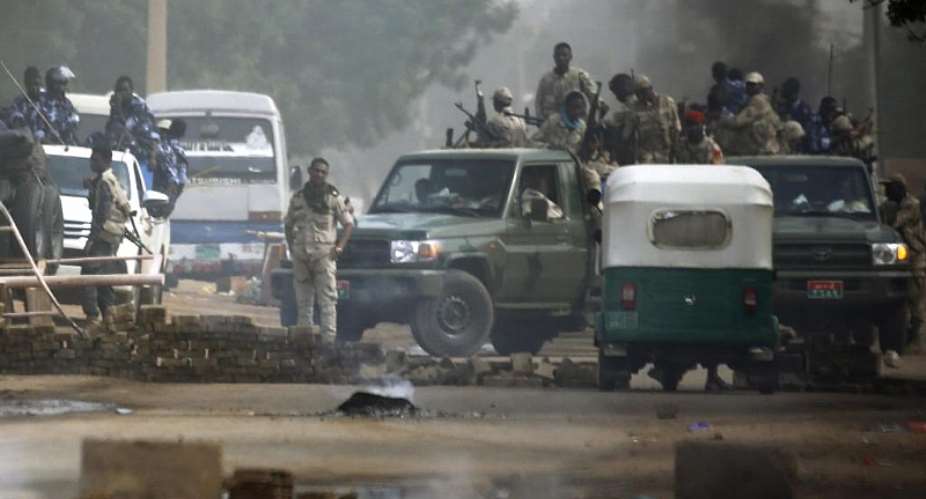The Sudanese activist group that had been negotiating with military rulers has called off talks after at least 13 sit-in protesters were killed outside Khartoum's army headquarters on Monday.
The Declaration of Freedom and Change Forces (DFCF), an alliance of the protesters, reacted to the Transitional Military Council's (TMC) attack on the months-long sit-in protest outside military headquarters in the capital.
Calling it a “bloody massacre”, the Sudan Professionals Association, which began the protests in December, called on civilians to take part in “total civil disobedience” in order to remove the TMC from ruling the country.
The Central Committee of Sudanese Doctors, who have documented the protests and attacks on social media, said that there had been a large number of “critical casualties” and asked for medical aid organisations to help in dealing with the wounded.
They also reported that security forces were firing inside of the East Nile Hospital in Khartoum, “chasing peaceful protesters”.
A number of military pickup trucks mounted with machine guns were sent throughout the capital.
The military "did not disperse the sit-in by force", their spokesman Shamseddine Kabbashi told Sky News Arabia. "The tents are there, and the youth are moving freely."
Meanwhile, British Ambassador Irfan Siddiq, among others on social media, said he could hear gunfire from his residence in Khartoum.
“Extremely concerned by... reports that Sudanese security forces are attacking the protest sit-in site resulting in casualties. No excuse for any such attack. This. Must. Stop. Now." he wrote.
The US embassy in Khartoum also denounced the attacks by the military.
"Responsibility falls on the TMC. The TMC cannot responsibly lead the people of Sudan," it said on social media.
Both Britain and the US have called on the TMC to peacefully hand over power to civilians. The council took power in May after longtime President Omar al-Bashir was deposed in April.
The protesters and the military could not agree on whether to have a military or civilian transitional government before elections.
The rallies and protests against Bashir began in December and have continued unabated for the past five months.
The Alliance for Freedom and Change, the umbrella group of the protest movement, has encouraged protesters to put up barricades in and around the capital, which civilians reportedly have been doing.





 "I can now see clearly with my two eyes, thanks to the generosity of Afenyo-Mark...
"I can now see clearly with my two eyes, thanks to the generosity of Afenyo-Mark...
 Amansie Central: Violent rainstorm causes havoc at Jacobu; one dead
Amansie Central: Violent rainstorm causes havoc at Jacobu; one dead
 Renaming Ho Technical University after Ephraim Amu is illegal – Minority slams g...
Renaming Ho Technical University after Ephraim Amu is illegal – Minority slams g...
 Gomoa Akotsi: Truck crashes into police vehicle, one dead, several officers inju...
Gomoa Akotsi: Truck crashes into police vehicle, one dead, several officers inju...
 Election 2024: Power outages will affect NPP – Political scientist
Election 2024: Power outages will affect NPP – Political scientist
 NPP is 'a laughing stock' for luring 'poster-stickers', 'noisemaking babies' wit...
NPP is 'a laughing stock' for luring 'poster-stickers', 'noisemaking babies' wit...
 Dumsor: Matthew Opoku Prempeh must be removed over power crisis – IES
Dumsor: Matthew Opoku Prempeh must be removed over power crisis – IES
 PAC orders WA East DCE to process requests from their MP
PAC orders WA East DCE to process requests from their MP
 Defectors who ditched Alan’s Movement to rejoin NPP were financially induced – A...
Defectors who ditched Alan’s Movement to rejoin NPP were financially induced – A...
 Dumsor: Akufo-Addo has taken Ghanaians for granted, let’s organise a vigil – Yvo...
Dumsor: Akufo-Addo has taken Ghanaians for granted, let’s organise a vigil – Yvo...
